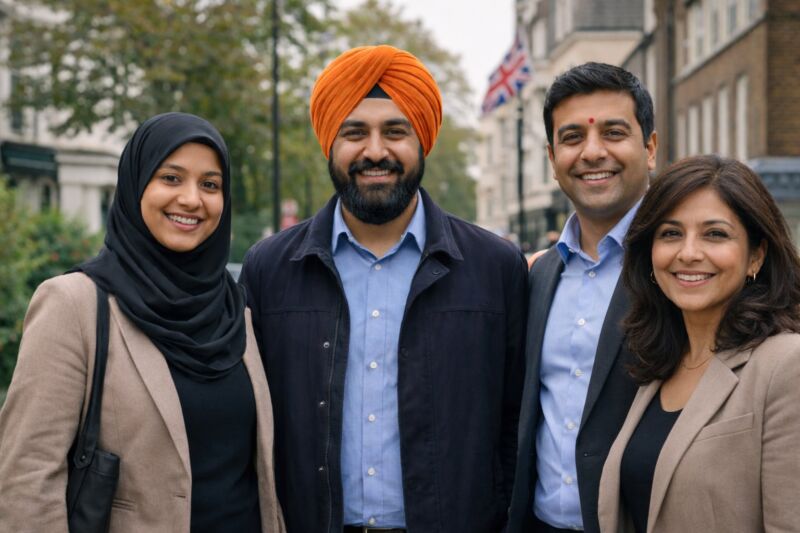A ‘powderkeg’ of social tensions and grievances – including polarisation and division, declining political trust and economic pessimism – remain unaddressed across the UK, according to new research. One year on from last summer’s riots, unrest risks being reignited unless urgent action is taken to address these issues.
Successive governments have failed to take sustained, proactive measures to address these challenges, the report says. Instead, it argues that “A ‘doom loop’ of inaction, crisis and piecemeal response has failed to strengthen the foundations of communities across the country.”
The new report, ‘The State of Us’, by British Future and the Belong Network, is the most comprehensive examination of cohesion and community strength in the UK since the riots of last summer. It finds widespread public concerns about declining public services, inequality and the cost of living; worries about the impact of social media; and a lack of trust in politicians and institutions to help put things right. It also identifies immigration and asylum as a salient issue raised by research participants, often focused on integration and pressures on housing and public services. Three in ten respondents (30%) in the Focaldata poll selected ‘Divisions between people who have migrated to the UK, arrived as refugees or sought asylum, and people born in the UK’ as the top issue negatively affecting how people from different backgrounds get on in their local area.
Lack of social contact is also a key issue. Three in ten adults (31%) – 15 million people – say they rarely or never have opportunities to meet people from different backgrounds. A similar number (30%) say they don’t frequently get a chance to meet other people at all in their local community. One reason is money: half the public (50%) say they don’t always have enough money to go to places where they would meet other people. The research finds that those who ‘often’ get to meet others from different backgrounds are significantly more likely to feel that people from different backgrounds get along in their local area (80%), compared to those who ‘rarely’ do so (54%).
The research also found reasons for optimism that change is possible. There are strong foundations of cohesion at neighbourhood level, with 69% of people feeling their local area is a place where people from different backgrounds get on well together. Many participants recalled moments of togetherness and community strength in adversity during the Covid-19 lockdowns. The research also highlights numerous examples of impactful work across the UK. These were often led by local authorities and civil society, to empower communities, build shared identities and strengthen relationships between people from different backgrounds.
Research for the report incorporated the views of 177 UK organisations working on social cohesion and community development, through regional roundtables, as well as 113 written submissions of evidence. A nationally representative survey by Focaldata and eight focus groups in towns and cities across the UK, including in areas that experienced riots, assessed public opinion.
Jake Puddle, Senior Researcher at British Future, who led the research, said:
“We are facing a long, hot summer, with a powder keg of tensions left largely unaddressed from last year that could easily ignite once again. People are unhappy about their standard of living and the state of their local area, and don’t trust politicians to sort it out.
“Public concerns about immigration and asylum can also be a flashpoint. That’s only made worse when people have little contact with new arrivals, where public voices exacerbate division, and where governments fail to support or consult communities in their plans for asylum accommodation.”
Kelly Fowler, Chief Executive of the Belong Network, said:
“Good work is happening across the UK on cohesion and community strength, but it is patchy and often confined to areas of high diversity or where tensions have spilled over into unrest. A lack of sustained funding limits its impact. It’s time this issue was treated with the urgency it merits, in every part of Britain. We must not wait for more riots to happen.”
The report is a foundational input to the new Independent Commission on Community and Cohesion, chaired by Sir Sajid Javid and Jon Cruddas, which held its inaugural meeting of Commissioners last month.
In a foreword to the report, Sir Sajid Javid and Jon Cruddas write:
“The bonds that hold society together – civic participation and a shared sense of belonging – are under growing pressure. This is leaving our society more fragmented, fragile and less resilient to internal and external threats. At the same time, forces driving division are intensifying, political polarisation is deepening and trust in institutions is declining.”
“Only through coordinated leadership and collaboration across sectors can we build resilience and connection on a national scale – but it will take boldness, bravery, and a willingness to step outside our comfort zones.”
The Independent Commission on Community and Cohesion aims to develop recommendations for policymakers and a collective vision for the future of our communities. Phase Two of the Commission’s research will feature a UK-wide ‘national conversation’ designed to hear directly from the public about how they experience connection and belonging, and the changes they want to see. The Commission is supported by the /together initiative, which acts as its secretariat. More details at www.livingwelltogether.org.uk.
Download a copy of ‘The State of Us’ report here.
Photo by Yelim LEE / AFP via Getty Images.













